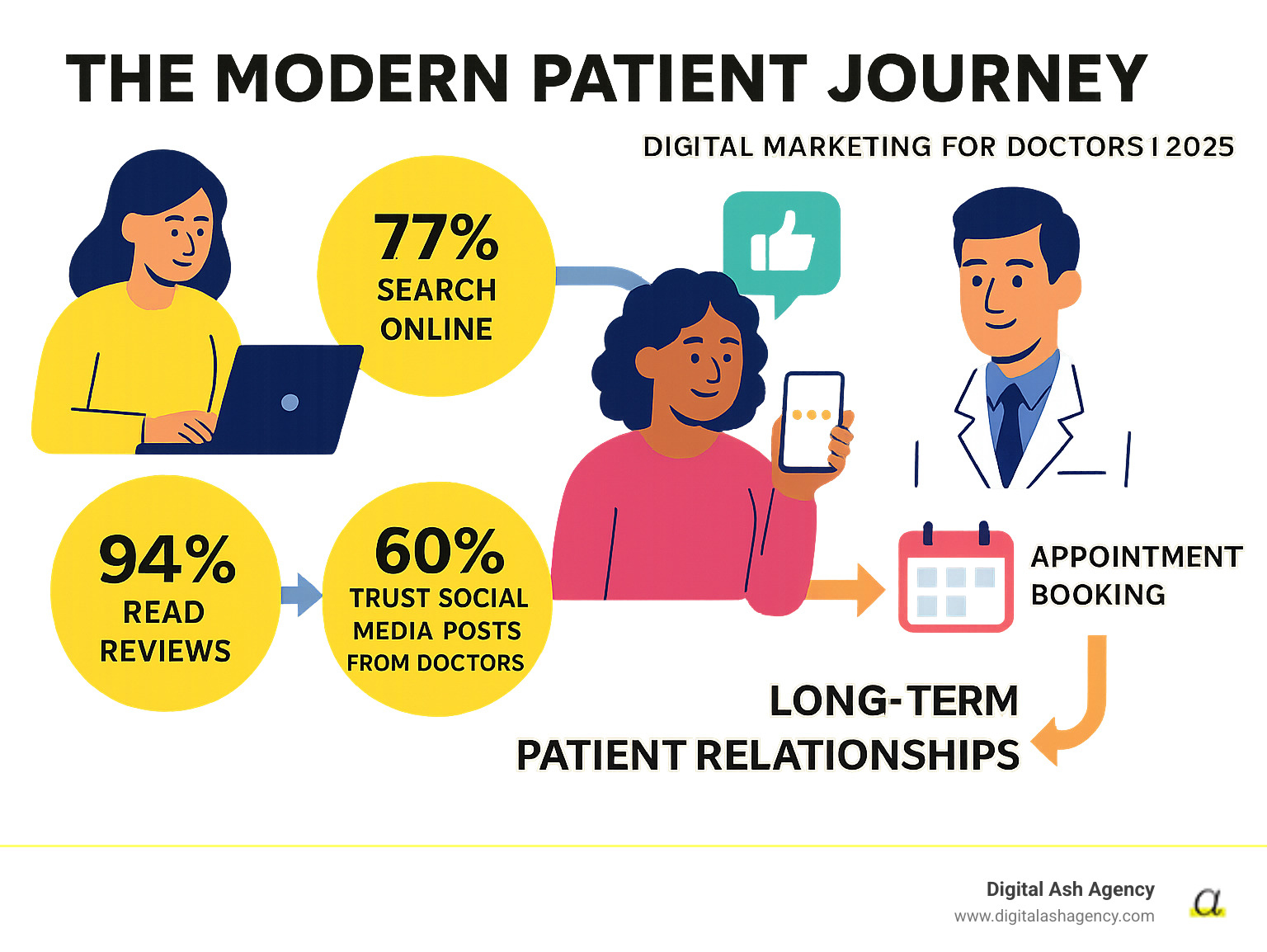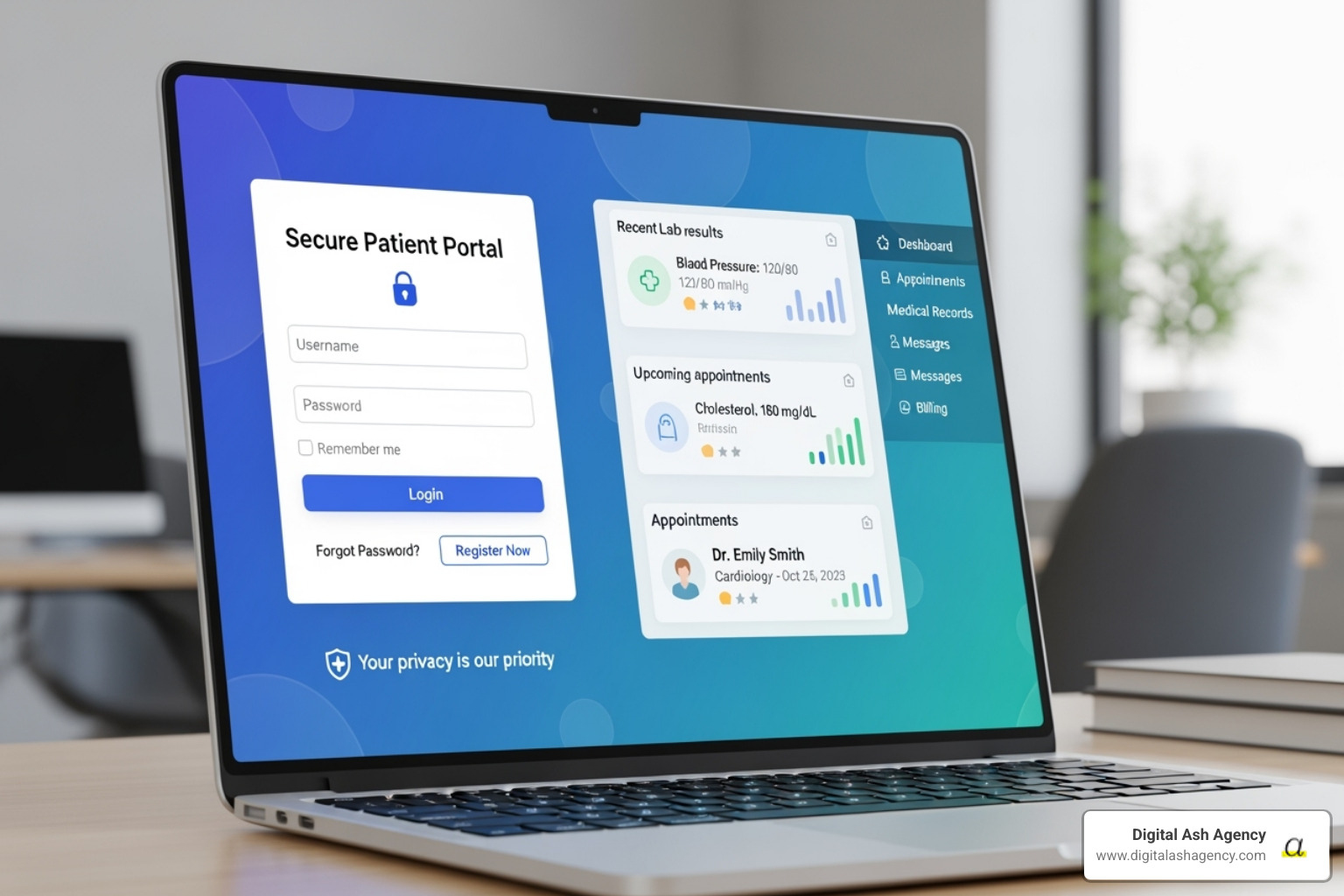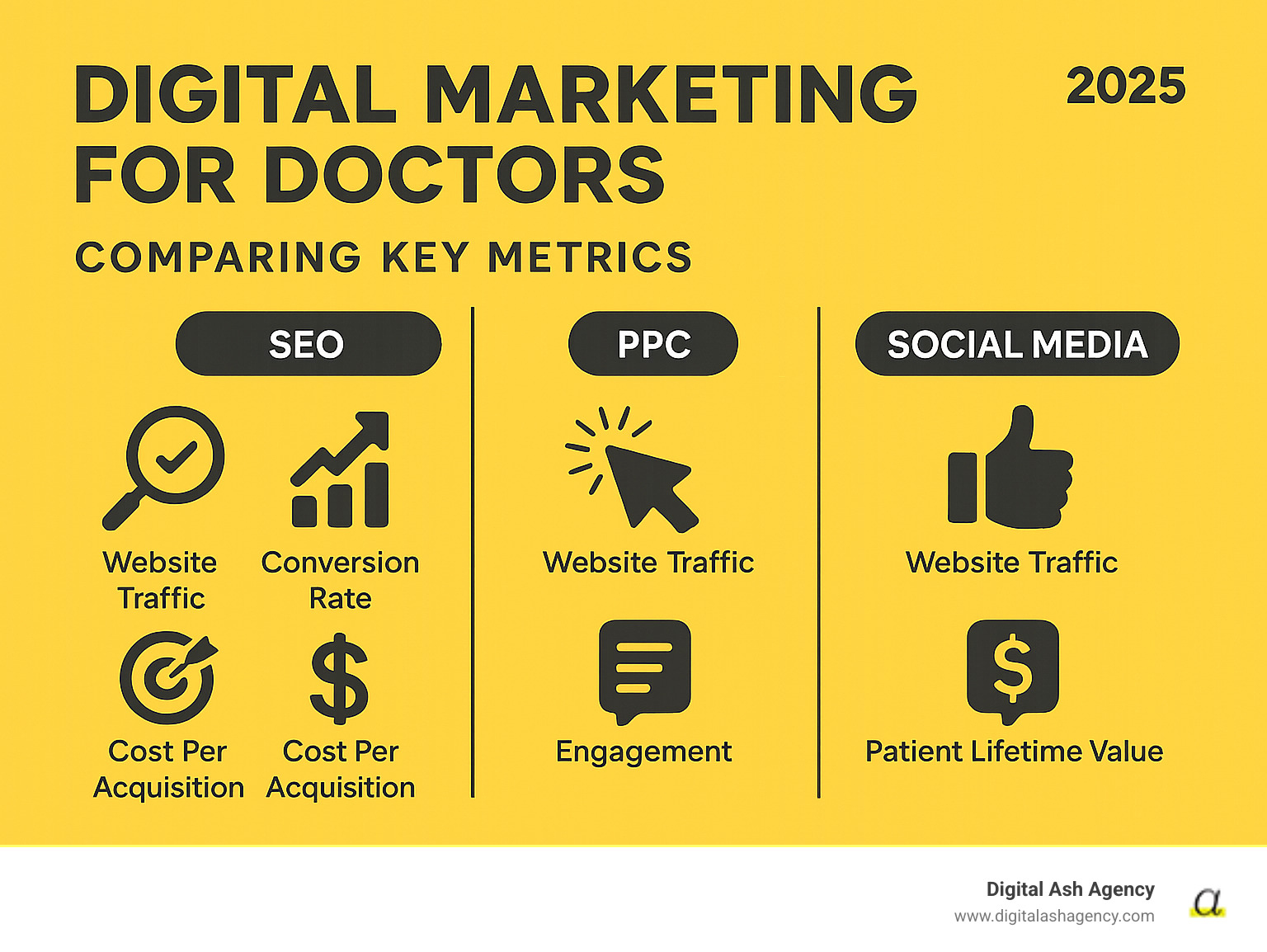
Why Digital Marketing Has Become Essential for Today's Medical Practices
Digital marketing for doctors is no longer optional—it's essential for practice growth and patient acquisition. Here's what every medical practice needs to know:
- Website & SEO: Your digital front door that 77% of patients use before booking
- Online Reviews: 94% of patients read reviews before choosing a provider
- Content Marketing: Educational blogs and videos that build trust and authority
- Social Media: Platforms where 60% of patients trust doctors' health posts
- Paid Advertising: Targeted Google and Facebook ads for immediate visibility
- Email Marketing: Patient newsletters and appointment reminders
- Compliance: HIPAA-compliant strategies that protect patient privacy
The healthcare landscape has fundamentally shifted. When physicians enter medical school, they focus on healing people—not marketing strategies. Yet today's reality is stark: 77% of patients conduct a search before booking a healthcare provider. This means your clinical expertise means little if patients can't find you online.
Traditional word-of-mouth referrals still matter, but they're no longer enough. Patients now expect to research doctors online, read reviews, and evaluate credentials before making appointments. The practices thriving today understand this shift and have adapted their marketing accordingly.
Healthcare advertising expenditures in the U.S. increased by 11.5% in 2022, reflecting how competitive the medical field has become. Independent practices now compete not just with other doctors, but with corporate clinics, urgent care centers, and telemedicine platforms—all fighting for the same patients.
I'm Ashley Gay, a branding expert who helped my physician husband's practice bill $239K in the first 90 days and reach nearly $1 million in year one through strategic digital marketing for doctors. I've learned that successful medical marketing requires both clinical credibility and smart online positioning to build the practice patients love and physicians love to own.

Why Digital Marketing is Essential for Modern Medical Practices
The healthcare world has changed dramatically. Patient empowerment is now the norm—people research symptoms online, compare doctors like they're shopping for cars, and make healthcare decisions armed with information they've gathered themselves. This shift means your medical expertise is only half the equation. The other half? Making sure patients can actually find you.
Think about it: when was the last time you chose a restaurant without checking reviews first? Your patients think the same way about healthcare providers. They're doing their homework before they ever pick up the phone to call your office.
Increased healthcare competition has made this shift even more critical. You're not just competing with the doctor down the street anymore. Corporate clinics with massive marketing budgets, convenient urgent care centers, and telehealth platforms are all vying for your patients' attention. Traditional referrals still matter, but they won't keep your schedule full in today's market.
Building online trust has become essential because that's where your patients are making their first impressions. Before they meet you in person, they've likely visited your website, read your reviews, and maybe even watched a video you posted about their condition. This digital first impression can make or break their decision to book an appointment.
Your practice visibility online directly impacts your bottom line. When patients search for "cardiologist near me" or "pediatrician accepting new patients," you want to show up. If you don't, they'll find someone who does. It's that simple.
Digital marketing for doctors also helps you reach new demographics effectively. While 71% of Instagram users are under 35, a significant 72% of people aged 50-64 use Facebook. This means you can tailor your message to different age groups where they're already spending their time. And here's a wake-up call: 62% of Gen Z patients won't even consider a provider with few or no reviews.
Perhaps the most compelling reason to accept digital marketing is its cost-effectiveness. Digital marketing is less expensive than traditional marketing, and it delivers measurable results. While a newspaper ad might cost thousands with no way to track its effectiveness, digital strategies let you see exactly how many people visited your website, called your office, or booked appointments.
For every $1 spent on digital advertising, businesses can generate an impressive $8 in profits. That's the kind of return on investment that makes sense for any practice budget. The numbers back this up—U.S. healthcare advertising spend increased 11.5% as practices recognize the value of digital reach.
The reality is that digital marketing for doctors transforms casual browsers into committed patients. It's about building relationships before patients even walk through your door and helping your practice thrive, even when you're navigating competitive markets or non-compete agreements.
Your clinical skills will always be your foundation, but in today's world, digital marketing is what helps patients find those skills in the first place.
The Core Components of Digital Marketing for Doctors
When my husband and I first started building his practice, we quickly learned that successful digital marketing for doctors isn't about throwing everything at the wall to see what sticks. It's more like conducting an orchestra—each instrument has its role, and when they play together, the result is beautiful music that attracts patients and builds lasting relationships.

Think of your digital marketing strategy as a well-oiled machine with several key parts working together. Search Engine Optimization (SEO) makes sure patients can find you when they're searching online. Content marketing educates your patients and shows them you're the expert they can trust. Social media marketing lets you connect with your community and show your practice's personality. Pay-per-click advertising brings immediate traffic when you need it most. And online reputation management makes sure those positive patient experiences translate into reviews that attract new patients.
Each of these components supports the others. Your SEO efforts drive traffic to your educational blog posts. Those blog posts get shared on social media, which builds your reputation. Happy patients leave reviews and sign up for your newsletter. It's all connected, and that's what makes it so powerful. See examples of our work to understand how these strategies come together in real medical practices.
Website & SEO: Your Digital Front Door
Your website is working 24/7, even when your office is closed. It's often the first impression potential patients get of your practice, and with 77% of patients searching online before booking an appointment, that first impression better be a good one.
I've seen too many talented doctors lose patients to competitors simply because their website looked like it was built in 2005 or took forever to load. Your website isn't just a digital business card—it's your hardest-working employee.
Mobile-first design isn't optional anymore. Over half of your website visitors are browsing on their phones, and if your site doesn't look great on mobile, they'll hit the back button faster than you can say "patient acquisition." Even more important? Speed matters. If your website takes more than three seconds to load, most people will give up and try the next doctor on their search results.
Your user experience should be smooth and intuitive. Patients should be able to find your phone number, address, and appointment booking within seconds of landing on your site. Make it easy, and they'll reward you with their business.
On-page SEO is where the magic happens behind the scenes. This means using relevant keywords naturally throughout your content so Google understands what you do and where you do it. If you're a pediatrician in Denver, those words should appear in your page titles, descriptions, and content.
Local SEO is absolutely crucial for medical practices. "Near me" searches have exploded by over 900% in recent years. People want convenient healthcare, and they're searching for it locally. Your Google Business Profile setup is essential—it's often the first thing patients see when they search for doctors in your area. Keep your NAP consistency (Name, Address, Phone number) identical across all online directories. Here's something that might surprise you: 32% of people trust Google Business Profile listings more than your actual website. That's how important your local presence is.
Online Reputation Management: Building Trust with Reviews
Let me be honest—online reviews can make or break your practice. They're the new word-of-mouth, and they're incredibly powerful. 94% of patients read online reviews before choosing a healthcare provider, and 84% trust reviews as much as personal recommendations from friends and family.

The numbers tell a compelling story. 47% of patients will go out of network based on positive reviews, and 75% won't consider doctors with less than 4 stars. For younger patients, it's even more critical—62% of Gen Z patients won't even look at providers with few or no reviews.
Encouraging patient reviews starts with providing excellent care, but it doesn't end there. Train your staff to politely ask satisfied patients to share their experience online. Make it simple by providing direct links to your Google Reviews, Healthgrades, and Vitals profiles.
Responding to feedback shows you care about patient experience. Thank patients for positive reviews—it shows appreciation and often encourages others to leave reviews too. When you receive negative feedback, respond professionally and empathetically. Offer to discuss the issue privately. This approach often turns unhappy patients into advocates and shows potential patients that you take concerns seriously.
Patient testimonials are social proof gold. Whether written or video testimonials, they build trust and credibility on your website and social media channels. Just make sure you have proper consent for any testimonials you use.
Content & Social Media: A Key Part of Digital Marketing for Doctors
Content marketing is about becoming the trusted expert your patients turn to for reliable health information. When you consistently provide valuable, educational content, you're not just marketing—you're building relationships and establishing yourself as the go-to authority in your field.
Educational content addresses the questions your patients are already asking. Create blog posts about common conditions, explain procedures in simple terms, or debunk health myths you hear in your office every day. When patients search for "What is high blood pressure?" or "How do I prepare for surgery?", your helpful content could be exactly what they find.
Thought leadership happens when you consistently share insights that help people understand complex health topics. This builds trust before patients ever step into your office. They already feel like they know and trust you because you've been helping them learn.
Your social media presence should reflect where your patients spend their time online. 71% of Instagram users are under 35, making it perfect for reaching younger patients with health tips and behind-the-scenes content. Facebook attracts 72% of adults aged 50-64, ideal for more detailed health education and community building.
Here's encouraging news: 60% of patients trust doctors' posts on social media, and 41% use social media to help choose their healthcare providers. Your authentic, helpful posts can genuinely influence patient decisions.
Video content is particularly powerful—video marketers get 66% more qualified leads than those who don't use video. Simple explanation videos, virtual office tours, or quick health tips can significantly boost your engagement.
Whether you're just starting out or have an established practice, content marketing builds the foundation for long-term growth. For practices just getting started, marketing for new practices often begins with creating educational content that establishes your expertise and attracts your first patients.
Paid Advertising (PPC) and Email Marketing: Accelerating Growth
While SEO and content marketing build your practice's foundation, paid advertising and email marketing can accelerate your growth when you need results faster.
Pay-per-click advertising through Google Ads and social media ads puts your practice in front of patients actively searching for your services. The targeting is incredibly precise—you can reach people in your exact geographic area who are searching for your specialty. For every $1 spent on PPC advertising, businesses typically see $8 in profits—that's an impressive return on investment.
Healthcare PPC campaigns typically see a 3.82% click-through rate and 2.4% conversion rate, with an average cost per lead of about $125. While Google has restrictions on direct medical advertising, we've found creative approaches work well—like promoting educational content that naturally leads patients to your services.
Landing pages are crucial for PPC success. When someone clicks your ad, they should land on a page specifically designed to convert that traffic into appointments. Don't send ad traffic to your homepage—create dedicated pages that match what your ads promise.
Email marketing is one of the most cost-effective ways to nurture patient relationships. 93% of patients wish their doctors would communicate with them via email, and 59% say marketing emails influence their healthcare decisions. This shows patients actually want to hear from you between appointments.
Patient newsletters can include health tips, practice updates, and reminders about preventive care. Appointment reminders reduce no-shows and improve patient satisfaction. The key is providing value in every email while staying HIPAA-compliant and respecting patient privacy.
Both PPC and email marketing work best when they're part of your overall digital marketing for doctors strategy, supporting and amplifying your other marketing efforts.
Navigating Compliance and Measuring Success
When you're a healthcare provider stepping into the digital world, it feels a bit like walking through a minefield while juggling patient care and practice growth. The good news? You don't have to steer this alone. Understanding compliance requirements and measuring your marketing success are two sides of the same coin—both essential for building a thriving, ethical practice online.

The healthcare industry operates under strict regulations for good reason—patient trust and privacy are sacred. When we bring digital marketing for doctors into the picture, these rules don't disappear. They become even more important because now we're handling patient information across digital platforms, social media, and online communications.
Think of compliance as your safety net, not a barrier. It protects both your patients and your practice from serious legal and ethical issues. Meanwhile, measuring your marketing efforts ensures you're not throwing money into a black hole. You want to see real results—more patients walking through your doors, stronger relationships with existing patients, and sustainable practice growth.
Key Compliance Rules for Digital Marketing for Doctors
Patient privacy isn't just about following rules—it's about honoring the trust your patients place in you every single day. When patients share their health concerns, they're being vulnerable. That same vulnerability extends to how we handle their information in our marketing efforts.
The HIPAA Privacy Rule serves as our North Star for protecting patient health information. This means every patient testimonial needs explicit written consent before you can share it, even if you remove names or identifying details. Those heartwarming success stories that could transform your marketing? They're powerful, but they require proper authorization first.
Secure communication channels are non-negotiable when you're reaching out to patients through email newsletters, appointment reminders, or patient portals. If it's not HIPAA-compliant, don't use it. Period. Your patients trust you with their most personal information, and that trust extends to every digital touchpoint.
Honest marketing claims might seem obvious, but it's worth emphasizing. Every statement about your services, expertise, or patient outcomes must be truthful and verifiable. Exaggerated claims don't just hurt your credibility—they can land you in legal trouble. Patients appreciate transparency, and honesty builds the kind of long-term relationships that sustain a practice.
The Stark Law and Anti-Kickback Statute add another layer of complexity, especially when forming marketing partnerships or offering patient incentives. These laws prevent conflicts of interest and ensure that patient referrals are based on medical necessity, not financial gain. Understanding these regulations helps you avoid unintentional violations while building ethical marketing strategies.
How to Measure Your Marketing ROI
Here's the truth: most medical practices start seeing measurable improvements in website traffic and patient inquiries within 3 to 6 months of launching focused marketing campaigns. But here's the catch—you'll only see these improvements if you're actually measuring them.
Website traffic analytics tell you who's finding your practice online and how they're getting there. Google Analytics becomes your best friend, showing whether patients are finding you through search engines, social media, or online ads. But traffic alone doesn't pay the bills—you need to know what happens next.
Conversion rates reveal the real story. Are website visitors actually calling your office, filling out contact forms, or booking appointments? We use call tracking and form submission tracking to connect the dots between your marketing efforts and actual patient actions. This data helps you understand which marketing channels are bringing in serious inquiries versus just curious browsers.
Cost Per Acquisition (CPA) answers the crucial question: "How much am I spending to get each new patient?" This metric helps you compare the efficiency of different marketing channels. Maybe your Google Ads cost $150 per new patient while your social media efforts cost $75 per patient. That's valuable information for budget planning.
Patient Lifetime Value (LTV) takes the long view. A new patient might generate $500 in their first visit, but over several years, they could bring in $5,000 or more in revenue. Understanding LTV helps you make smarter decisions about how much you're willing to invest in patient acquisition.

The beauty of digital marketing lies in its measurability. Unlike traditional advertising where you're guessing at results, digital strategies provide clear data about what's working and what isn't. Regular review of these metrics allows you to adjust your approach, reallocate resources, and maximize your return on investment.
Successful digital marketing for doctors isn't about perfection from day one—it's about consistent improvement based on real data and unwavering commitment to patient privacy and ethical practices.
Should You Hire a Specialized Healthcare Marketing Agency?
This is the question that keeps many doctors up at night: "Can I handle this marketing stuff myself, or do I really need professional help?" It's a valid concern, especially when you're already juggling patient care, administrative duties, and trying to maintain some semblance of work-life balance.
Here's the reality: digital marketing for doctors has become incredibly sophisticated. What used to be simple newspaper ads and Yellow Pages listings has evolved into a complex ecosystem of SEO algorithms, social media strategies, compliance requirements, and data analytics. While your expertise lies in healing people, ours lies in helping practices grow through strategic digital marketing.
The time versus expertise dilemma is real. Most physicians are working 50+ hour weeks seeing patients, staying current with medical research, and managing their practices. Learning the ins and outs of Google Ads, mastering social media algorithms, or understanding the nuances of local SEO isn't just time-consuming—it's a full-time job in itself. When you're spending evenings trying to figure out why your Facebook ads aren't converting, that's time taken away from patient care or your family.
Specialized healthcare marketing agencies bring something invaluable to the table: deep understanding of the medical industry's unique challenges. We know that you can't just copy what works for a restaurant or retail store. Healthcare marketing requires navigating HIPAA compliance, understanding patient psychology, and building trust in an industry where people's health is literally on the line. We've seen what happens when general marketing agencies try to work with medical practices—they often miss critical compliance issues or create content that doesn't resonate with healthcare consumers.
The challenges of DIY marketing go beyond just time constraints. Many practices start with good intentions, setting up a Facebook page or trying to optimize their website. But without consistent effort and expertise, these initiatives often fizzle out. We've worked with doctors who spent months trying to improve their Google rankings, only to realize they were targeting the wrong keywords or had technical issues holding them back. Others have inadvertently violated HIPAA guidelines in their social media posts or email campaigns, creating potential legal headaches.
When evaluating a healthcare marketing agency, look for partners who understand your world. They should be well-versed in HIPAA compliance and other healthcare regulations. They should have a proven track record with medical practices and be able to show you real results, not just fancy presentations. Most importantly, they should offer transparency about their strategies and costs, treating you as a partner rather than just another client.
At Digital Ash Agency, we specialize in building relationships and helping practices thrive, even when navigating non-compete agreements and competitive markets. We understand that every practice is different—a new startup needs different strategies than an established practice looking to expand. That's why we offer custom approaches for both new practices starting from scratch and established practices looking to grow their patient base.
The bottom line? You became a doctor to help people, not to become a marketing expert. Partnering with specialists who understand healthcare marketing lets you focus on what you do best while ensuring your practice gets the visibility it deserves.
Conclusion
The world of digital marketing for doctors has transformed from a nice-to-have into an absolute necessity. Think about it—when 77% of patients are searching online before they even pick up the phone to call your office, can you really afford to be invisible in the digital space?
Throughout this guide, we've walked through the essential building blocks that make medical practices thrive online. Your website serves as that tireless 24/7 receptionist, greeting potential patients and making that crucial first impression. Online reviews have become the modern version of word-of-mouth referrals, with 94% of patients trusting them as much as personal recommendations. Content marketing and social media let you educate and connect with your community, while targeted advertising and email campaigns help you reach the right patients at exactly the right time.
But here's what makes healthcare marketing different from any other industry: compliance isn't optional. Every strategy, every post, every email must protect patient privacy while still helping your practice grow. It's a delicate balance that requires both marketing expertise and deep understanding of healthcare regulations.
The numbers don't lie. Practices that accept digital marketing see real, measurable growth. They attract more patients, build stronger relationships, and create sustainable competitive advantages in increasingly crowded markets. Meanwhile, practices that stick to old-school methods often struggle to fill their schedules and wonder where all their patients went.
At Digital Ash Agency, we've seen how the right digital marketing for doctors strategy can completely transform a practice. We're passionate about helping healthcare professionals build thriving patient communities through marketing that's both effective and ethical. We understand the unique challenges you face—from non-compete agreements to strict compliance requirements—and we know how to steer them successfully.
Your patients are already online, searching for the care you provide. The question isn't whether digital marketing works for medical practices—it's whether you're ready to meet your patients where they are.
Ready to stop losing patients to practices with stronger online presence? Contact Digital Ash Agency to grow your new practice and let's build a digital strategy that brings the right patients to your door.







